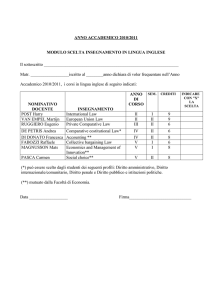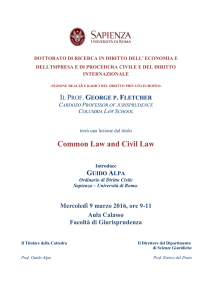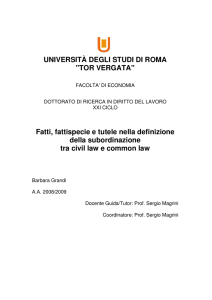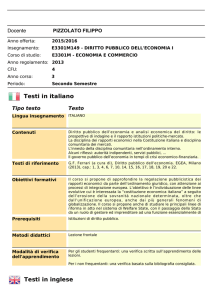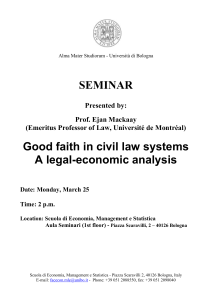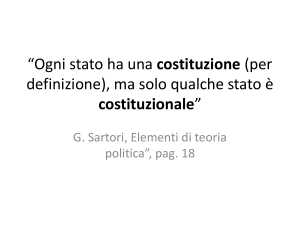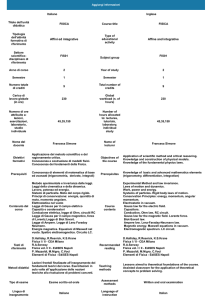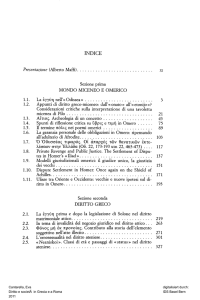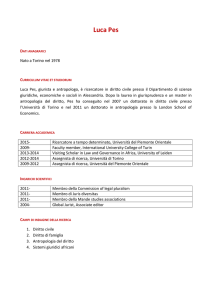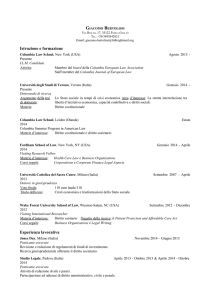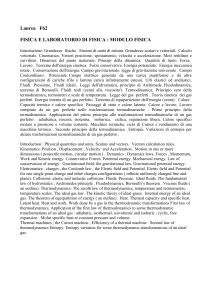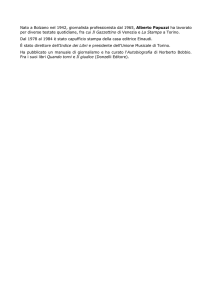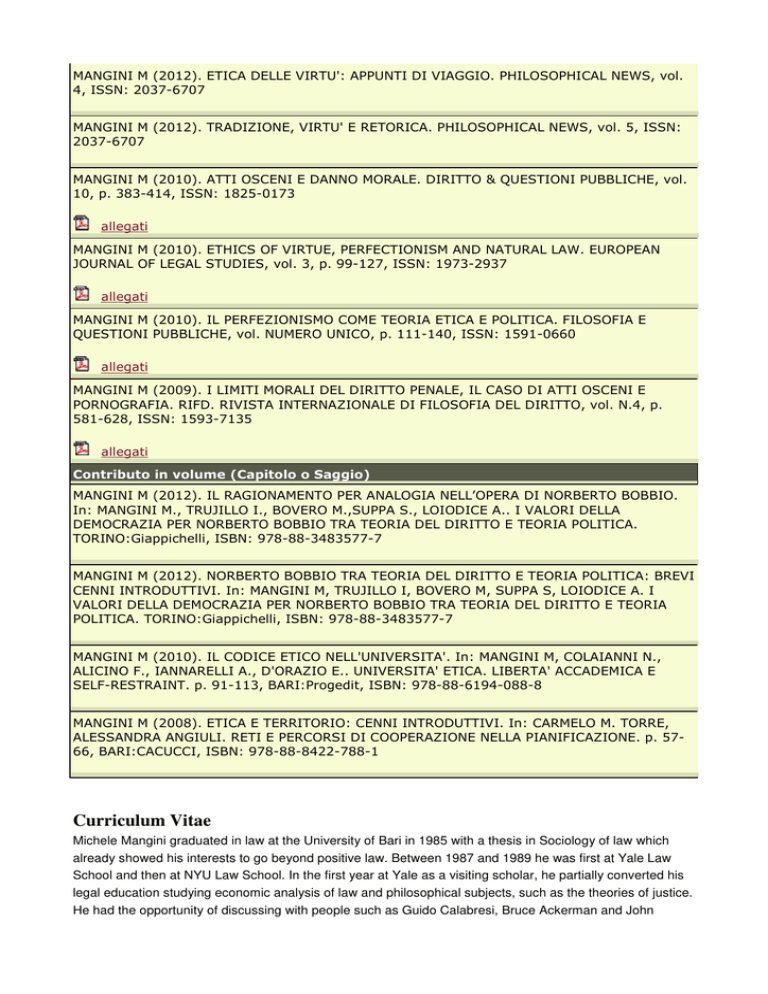
MANGINI M (2012). ETICA DELLE VIRTU': APPUNTI DI VIAGGIO. PHILOSOPHICAL NEWS, vol.
4, ISSN: 2037-6707
MANGINI M (2012). TRADIZIONE, VIRTU' E RETORICA. PHILOSOPHICAL NEWS, vol. 5, ISSN:
2037-6707
MANGINI M (2010). ATTI OSCENI E DANNO MORALE. DIRITTO & QUESTIONI PUBBLICHE, vol.
10, p. 383-414, ISSN: 1825-0173
allegati
MANGINI M (2010). ETHICS OF VIRTUE, PERFECTIONISM AND NATURAL LAW. EUROPEAN
JOURNAL OF LEGAL STUDIES, vol. 3, p. 99-127, ISSN: 1973-2937
allegati
MANGINI M (2010). IL PERFEZIONISMO COME TEORIA ETICA E POLITICA. FILOSOFIA E
QUESTIONI PUBBLICHE, vol. NUMERO UNICO, p. 111-140, ISSN: 1591-0660
allegati
MANGINI M (2009). I LIMITI MORALI DEL DIRITTO PENALE, IL CASO DI ATTI OSCENI E
PORNOGRAFIA. RIFD. RIVISTA INTERNAZIONALE DI FILOSOFIA DEL DIRITTO, vol. N.4, p.
581-628, ISSN: 1593-7135
allegati
Contributo in volume (Capitolo o Saggio)
MANGINI M (2012). IL RAGIONAMENTO PER ANALOGIA NELL’OPERA DI NORBERTO BOBBIO.
In: MANGINI M., TRUJILLO I., BOVERO M.,SUPPA S., LOIODICE A.. I VALORI DELLA
DEMOCRAZIA PER NORBERTO BOBBIO TRA TEORIA DEL DIRITTO E TEORIA POLITICA.
TORINO:Giappichelli, ISBN: 978-88-3483577-7
MANGINI M (2012). NORBERTO BOBBIO TRA TEORIA DEL DIRITTO E TEORIA POLITICA: BREVI
CENNI INTRODUTTIVI. In: MANGINI M, TRUJILLO I, BOVERO M, SUPPA S, LOIODICE A. I
VALORI DELLA DEMOCRAZIA PER NORBERTO BOBBIO TRA TEORIA DEL DIRITTO E TEORIA
POLITICA. TORINO:Giappichelli, ISBN: 978-88-3483577-7
MANGINI M (2010). IL CODICE ETICO NELL'UNIVERSITA'. In: MANGINI M, COLAIANNI N.,
ALICINO F., IANNARELLI A., D'ORAZIO E.. UNIVERSITA' ETICA. LIBERTA' ACCADEMICA E
SELF-RESTRAINT. p. 91-113, BARI:Progedit, ISBN: 978-88-6194-088-8
MANGINI M (2008). ETICA E TERRITORIO: CENNI INTRODUTTIVI. In: CARMELO M. TORRE,
ALESSANDRA ANGIULI. RETI E PERCORSI DI COOPERAZIONE NELLA PIANIFICAZIONE. p. 5766, BARI:CACUCCI, ISBN: 978-88-8422-788-1
Curriculum Vitae
Michele Mangini graduated in law at the University of Bari in 1985 with a thesis in Sociology of law which
already showed his interests to go beyond positive law. Between 1987 and 1989 he was first at Yale Law
School and then at NYU Law School. In the first year at Yale as a visiting scholar, he partially converted his
legal education studying economic analysis of law and philosophical subjects, such as the theories of justice.
He had the opportunity of discussing with people such as Guido Calabresi, Bruce Ackerman and John
Simon. In the second year at NYU he gained an LLM degree, attending mainly philosophical courses with
people such as Ronald Dworkin, Thomas Nagel, Derek Parfit and David J.Richards. Later on, between 1990
and ’91, thanks to a CNR scholarship, he could spend periods of research at Oxford University with the
supervision of Joseph Raz. He could attend at a Graduate seminar in Political Philosophy, organized by
Sebastiano Maffettone at Suor Orsola Benincasa Institute in Naples between 1993 and 1995.
He further spent other periods of research at Harvard University – between the Philosophy Dep. and the Law
School – in 1995 and ’97, working with the supervision of Thomas Scanlon and Frank Michelman. Finally, he
could attain a Ph.d. in Political Philosophy at Sussex University (GB) in 2004, with a thesis titled “The Good
Life in the Liberal State”. The thesis work was supervised by Andrew Chitty. Between 2000 and 2001 he
could also work at Sussex University as a Marie Curie Fellow on the issue of ‘The Ethical Integration of
Europe’.
He started teaching Sociology at the Law School of the University of Bari in 2002 and has been teaching
Political Philosophy as associate professor since 2005. He is currently teaching ‘Ethics and Law’ and
Philosophy of Law. He has also been teaching in various capacities at Suor Orsola Benincasa (Sociology of
Law and History of Modern and Contemporary Philosophy), LUM Bari (Philosophy of Law) and Politecnico of
Bari (‘Ethics and the Land’ within a Master program).
Since 2007 he has been organizing a ‘Colloquium on Liberalism and Natural Law Theory’ with guests
discussing on some of the intersections of those two main trends of thought.
His research interests have moved from the economic analysis of law and applied ethics, in particular
environmental ethics, to central issues in liberal theory. Being puzzled by the well-known weakness of the
liberal theory of the good, he has been long intrigued by the revival of the ethics of virtues and by
communitarian authors as promising ways out of the difficulties of Rawls’ theory of justice. Later on he was
persuaded that the correct way out from the liberal inadequacies with the good was a fully developed
perfectionist theory based on an Aristotelian understanding of the virtues, though free of metaphysical
underpinnings. The attempt at identifying a general perfectionist criterion goes through a parallel
interpretation of Aristotle and Kant.
The next step of his research path was that of searching for a ‘bridge solution’, able to define an area of
overlapping between a perfectionist liberalism and a natural law theory which could, at one time, offer an
appealing theory of the good for liberal citizens, without excluding people of religious beliefs, and save that
core of individual freedom which represents the essence of liberalism.
His current interests have moved partly in the direction of legal reasoning, taken as an application of ethical
reasoning and particularly of some kind of Aristotelian phronesis. He has been working on the intricacies of
analogical reasoning between civil law (Bobbio) and common law and, after approaching the recent revival of
rhetoric by Perelman and followers, is currently at work on possible lines of continuity between formalism –
focusing specially on common law formalism – and Aristotelian rhetoric.

